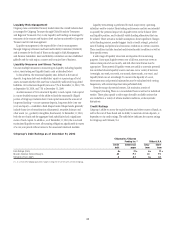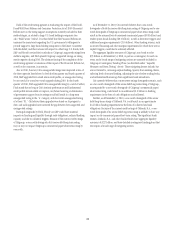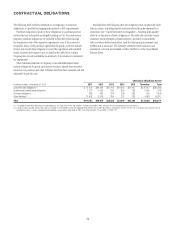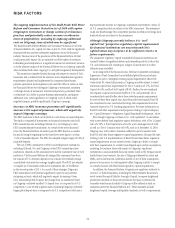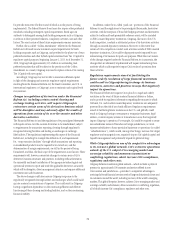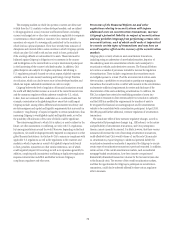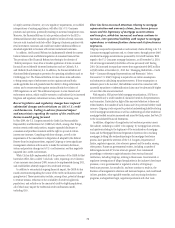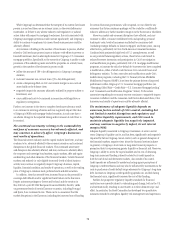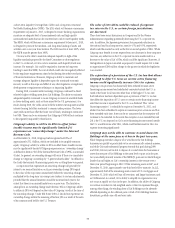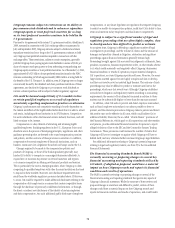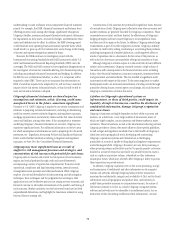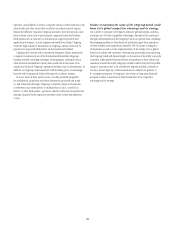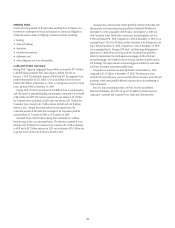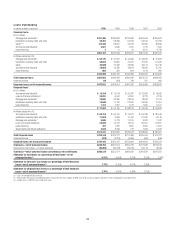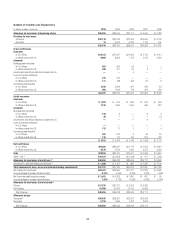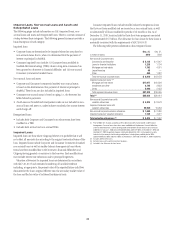Citibank 2010 Annual Report Download - page 80
Download and view the complete annual report
Please find page 80 of the 2010 Citibank annual report below. You can navigate through the pages in the report by either clicking on the pages listed below, or by using the keyword search tool below to find specific information within the annual report.78
Citigroup remains subject to restrictions on its ability to
pay common stock dividends and to redeem or repurchase
Citigroup equity or trust preferred securities for so long
as its trust preferred securities continue to be held by the
U.S government.
Pursuant to its agreements with certain U.S. government entities, dated June 9,
2009, executed in connection with Citi’s exchange offers consummated in
July and September 2009, Citigroup remains subject to dividend and share
repurchase restrictions for so long as the U.S. government continues to hold
any Citigroup trust preferred securities acquired in connection with the
exchange offers. These restrictions, subject to certain exceptions, generally
prohibit Citigroup from paying regular cash dividends in excess of $0.01 per
share of common stock per quarter or from redeeming or repurchasing any
Citigroup equity securities or trust preferred securities. As of December 31, 2010,
approximately $3.025 billion of trust preferred securities issued to the FDIC
remains outstanding (of which approximately $800 million is being held for
the benefit of the U.S. Treasury). In addition, even if Citigroup were no longer
contractually bound by the dividend and share purchase restrictions of these
agreements, any decision by Citigroup to pay common stock dividends or
initiate a share repurchase will be subject to further regulatory approval.
Citi could be harmed competitively if it is unable to hire
or retain qualified employees as a result of regulatory
uncertainty regarding compensation practices or otherwise.
Citigroup’s performance and competitive standing is heavily dependent on
the talents and efforts of the highly skilled individuals that it is able to attract
and retain, including without limitation in its S&B business. Competition
for such individuals within the financial services industry has been, and will
likely continue to be, intense.
Compensation is a key element of attracting and retaining highly
qualified employees. Banking regulators in the U.S., European Union and
elsewhere are in the process of developing principles, regulations and other
guidance governing what are deemed to be sound compensation practices
and policies, and the outcome of these processes is uncertain. In addition,
compensation for certain employees of financial institutions, such as
bankers, continues to be a legislative focus both in Europe and in the U.S.
Changes required to be made to the compensation policies and
practices of Citigroup, or those of the banking industry generally, may
hinder Citi’s ability to compete in or manage its businesses effectively, to
expand into or maintain its presence in certain businesses and regions,
or to remain competitive in offering new financial products and services.
This is particularly the case in emerging markets, where Citigroup is often
competing for qualified employees with other financial institutions that seek
to expand in these markets. Moreover, new disclosure requirements may
result from the worldwide regulatory processes described above. If this were
to occur, Citi could be required to make additional disclosures relating to the
compensation of its employees in a manner that creates competitive harm
through the disclosure of previously confidential information, or through
the direct or indirect new disclosures of the identity of certain employees
and their compensation. Any such additional public disclosure of employee
compensation, or any future legislation or regulation that requires Citigroup
to restrict or modify its compensation policies, could hurt Citi’s ability to hire,
retain and motivate its key employees and thus harm it competitively.
Citigroup is subject to a significant number of legal and
regulatory proceedings that are often highly complex, slow
to develop and are thus difficult to predict or estimate.
At any given time, Citigroup is defending a significant number of legal
and regulatory proceedings, and the volume of claims and the amount of
damages and penalties claimed in litigation, arbitration and regulatory
proceedings against financial institutions generally remain high.
Proceedings brought against Citi may result in judgments, settlements, fines,
penalties, injunctions, business improvement orders, or other results adverse
to it, which could materially and negatively affect Citigroup’s businesses,
financial condition or results of operations, require material changes in
Citi’s operations, or cause Citigroup reputational harm. Moreover, the many
large claims asserted against Citi are highly complex and slow to develop,
and they may involve novel or untested legal theories. The outcome of such
proceedings may thus be difficult to predict or estimate until late in the
proceedings, which may last several years. Although Citigroup establishes
accruals for its litigation and regulatory matters according to accounting
requirements, the amount of loss ultimately incurred in relation to those
matters may be substantially higher or lower than the amounts accrued.
In addition, while Citi seeks to prevent and detect employee misconduct,
such as fraud, employee misconduct is not always possible to deter or
prevent, and the extensive precautions Citigroup takes to prevent and detect
this activity may not be effective in all cases, which could subject Citi to
additional liability. Moreover, the so-called “whistle-blower” provisions of
the Financial Reform Act, which apply to all corporations and other entities
and persons, provide substantial financial incentives for persons to report
alleged violations of law to the SEC and the Commodity Futures Trading
Commission. These provisions could increase the number of claims that
Citigroup will have to investigate or against which Citigroup will have to
defend itself, and may otherwise further increase Citigroup’s legal liabilities.
For additional information relating to Citigroup’s potential exposure
relating to legal and regulatory matters, see Note 29 to the Consolidated
Financial Statements.
The Financial Accounting Standards Board (FASB) is
currently reviewing or proposing changes to several key
financial accounting and reporting standards utilized by
Citi which, if adopted as proposed, could have a material
impact on how Citigroup records and reports its financial
condition and results of operations.
The FASB is currently reviewing or proposing changes to several of the
financial accounting and reporting standards that govern key aspects of
Citigroup’s financial statements. While the outcome of these reviews and
proposed changes is uncertain and difficult to predict, certain of these
changes could have a material impact on how Citigroup records and
reports its financial condition and results of operations, and could hinder


